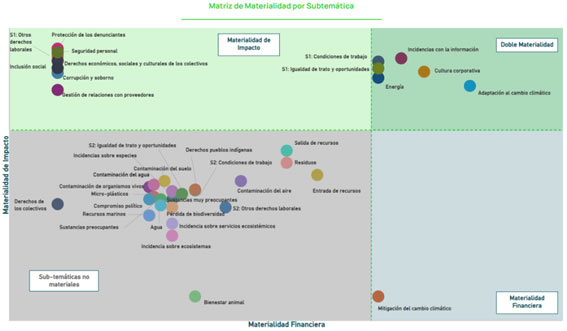STAKEHOLDER RELATIONS
Grupo Unicaja considers that its relationship with stakeholders is essential to set its sustainability strategy as well as to subsequently implement it through different plans and lines of action. That is why an exhaustive materiality analysis was conducted in 2024 following the indications laid down by Directive (EU) 2022/2464 as regards corporate sustainability reporting, better known as the CSRD Directive, which was used as the basis for preparing the 2024 Sustainability Report despite the fact that said Directive had not been transposed into Spanish law as of the date of the aforementioned report's drafting.
Within the context of said analysis, Unicaja recognises its customers and users, its shareholders and investors, its employees, the regulatory and supervisory authorities, and society at large as its main stakeholders.
Unicaja reviews the identification and selection of its stakeholders on a periodic basis, and also establishes and updates relevant communication channels with them. As is set out in the Grupo Unicaja Corporate Sustainability Policy, the institution provides mechanisms for relations with all stakeholders. It also places at their disposal several permanent two-way channels of communication and dialogue, which allow for their engagement and ensure they have the tools to be properly engaged with. In this regard, Unicaja's strategy is based on establishing a balanced, transparent and clear relationship with stakeholders.
Questionnaires are used in the process of identifying significant topics for any stakeholders that have been detected. These questionnaires can be grouped into two main categories:
- Surveys aimed at gathering stakeholders' interests and opinions within the context of the materiality assessment process.
- Surveys of stakeholders to gather their opinions and interests using a different approach to that the materiality assessment process, focusing instead on other or more specific topics.
Unicaja views identifying stakeholder needs as an opportunity to strengthen present and future links with society.
In so far as the surveys related to the materiality assessment process are concerned, their completion and analysis have enabled Unicaja to identify and assess the incidents (impact materiality) as well as the risks and opportunities (financial materiality) that affect both the institution and its stakeholders.
The materiality assessment process starts off with an overview of the institution's activities and business relationships, the context within which they are conducted and an understanding of the main stakeholders affected by them. Following this initial assessment, the Group identifies plausible IROs (impacts, risks and opportunities) related to environmental, social and governance topics in its own operations as well as in its upstream and downstream value chain. An initial list of the Group's potential material IROs is thus obtained. These are subsequently subjected to a more detailed assessment and analysis from the perspective of both impact materiality and financial materiality (dual materiality).
The materiality matrix is drawn up once the assessment of any incidents, risks and opportunities that have been detected is completed. Said matrix illustrating the outcomes of the analysis thus conducted in terms of financial materiality, impact and dual materiality is shown below:

The aim of this analyses is to identify Grupo Unicaja's material topics and subtopics in order to better manage their impacts and submit its sustainability reporting. It is therefore a core component of the 2024 Sustainability Report, which is available on the Unicaja corporate website in the Social Responsibility – Sustainability Reports section. This report covers the Group's relevant activities in this matter and provides a comprehensive and detailed overview of its initiatives and commitments in this area.